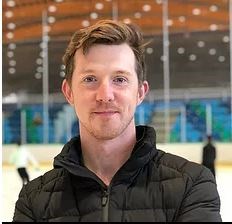When the young skaters step onto the ice, that’s their safe space, away from their troubles, if they have any.
That’s the adage that Connaught Skating coach Keegan Murphy sticks to and practises every single session when it comes to protecting the mental health and wellness of his young athletes at the Richmond club.
The no-added pressure environment is one of the key ingredients Murphy and his fellow coaches tap into, knowing that the kids in their charge may very well be arriving with some mental baggage from their respective days.
“It becomes a lot more intricate when they become teenagers, as there is social media and many more things that impact their lives, inside and outside of the sport,” Murphy told the Richmond News.
“As coaches, from the younger skaters to the elite athletes, we emphasize skating is their chosen passion and it’s a place for you to take care of your mental health.
“We create an environment where you leave all your other stresses behind, whether it’s family, social or academic.
“They may have expectations of themselves, but we reinforce that the sport is the balancing component in their lives.”
Murphy said, however, that the club is “very fortunate” in that their athletes are normally “very focused when they come here and we’ve done a lot of work to create that; but we are always looking to read an athlete’s body language to recognize if they’ve had a bad day.
“We try to talk as a group — and sometimes individually — that this is a place to leave that bad test or bad comment behind for an hour or two.
“We try to have a chat about their day, away from skating, to show that we also value them as people, not just skaters.
“When they realize their peers are often going through the same things, that can be therapeutic also.”
Murphy said he’s constantly looking for signals of issues off the ice, things that the young skaters won’t always talk about.
“If we’re noticing anything, we probably don’t go straight to the kid, we would maybe go to the parents and mention that we see a change in behaviour and it’s totally up to the family to take it from there,” added Murphy.
“If they need help from us, we have resources via Skate Canada, such as social media training, grief counselling; (Skate Canada has) taken a really active role in the last few years.
“They have really invested in this because they’ve realized, if we want them to ultimately perform on the highest stage, we need to look after their mental health.”
The last 18 months or so, said Murphy, has been one massive learning curve for coaches and athletes alike, with the pandemic forcing them to think on their feet to keep the kids tuned in mentally.
“We just had to support them all year long,” said Murphy.
“But having to tell them to stay at home was tough. We kept in touch with them every day via Zoom and did workouts outside when that was allowed.
“Last spring was treacherous as coaches. But the parents could see the mood in their kids was a lot more positive after that hour on Zoom seeing each other.
“We had to keep learning and adjusting and I think we succeeded, even though we were not prepared to teach figure skating via Zoom.”
All that hard work, added Murphy, has paid off, with the likes of Connaught skating star Wesley Chiu bagging titles on the international junior circuit this fall.
“If we had just twiddled our thumbs last year, we probably wouldn’t be where we are today with our skaters,” Murphy noted.



